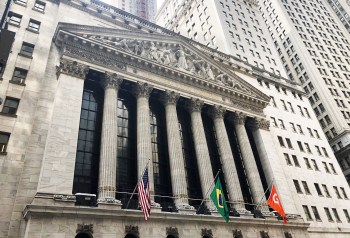
Why are stocks cratering around the globe?

The Dow Jones Industrial Average, Nasdaq Composite and S&P 500 all plummeted Monday, and stocks tumbled similarly around the globe. Japan’s Nikkei index had its worst day since 1987, dropping more than 12% and losing all its gains for the year. Markets in South Korea, Taiwan, Australia and Europe fell too.
“Chaotic,” “volatile,” “tumultuous” — not necessarily words you want to hear when it comes to the stock market. But here we are.
“Any time markets are this volatile … it raises difficult questions about where they might go from here and also what the root causes are,” said Carl Tannenbaum, chief economist at Northern Trust.
He pointed to two causes of the current instability. One being last week’s national jobs report for July, “which wasn’t nearly as good as the ones we’ve enjoyed through most of the past couple of years.”
But it wasn’t bad either. Though unemployment rose to 4.3%, that’s still a low reading.
“The second cause really comes from the Far East,” Tannenbaum said. “Japan’s economy has been one of the better performers during the past 12 months, and as a result, their central bank has seen fit to begin raising interest rates.”
That’s good for the Japanese yen, but less good for investors around the world “who have indulged in what is called a carry trade. Simply stated, they borrow money at very low interest rates in Japan and they invest elsewhere,” he explained.
But now, with higher interest rates and a stronger yen that isn’t looking quite so profitable, a lot of them are bailing.
Thomas Hoenig at the Mercatus Center at George Mason University said investors are worried that the U.S. economy may be faltering. Some recent economic data has come in weak, and “they don’t know where it’s going to end,” Hoeing said.
Will the unemployment rate level off, or will it keep rising? We don’t know.
“And so you get timid, and you say, ‘I’m going to get out of this [investment] now and then wait and see.’ And that creates uncertainty … and fear takes over,” said Hoenig.
The possibility of a recession looms large in traders’ fears right now. Amy Eremionkhale at DePauw University said if that were to happen, “no one wants to be the one left holding the bag.”
In other words, they’d rather sell their stocks early to be safe. We’ve seen this many times before.
When an economic report diverges from forecasts, it can “result in large either upward or downward movements,” said Charles Lieberman at Advisors Capital Management. “People do tend to overreact, and that’s why it’s important to go back to fundamentals.”
He added that the fundamentals of the economy are still strong — gross domestic product, consumer spending, the job market.
“The economy is not exactly struggling. It has slowed from a pace that was really unsustainably rapid. So it’s growing a little more slowly,” Lieberman said.
But still growing.
There’s a lot happening in the world. Through it all, Marketplace is here for you.
You rely on Marketplace to break down the world’s events and tell you how it affects you in a fact-based, approachable way. We rely on your financial support to keep making that possible.
Your donation today powers the independent journalism that you rely on. For just $5/month, you can help sustain Marketplace so we can keep reporting on the things that matter to you.

















